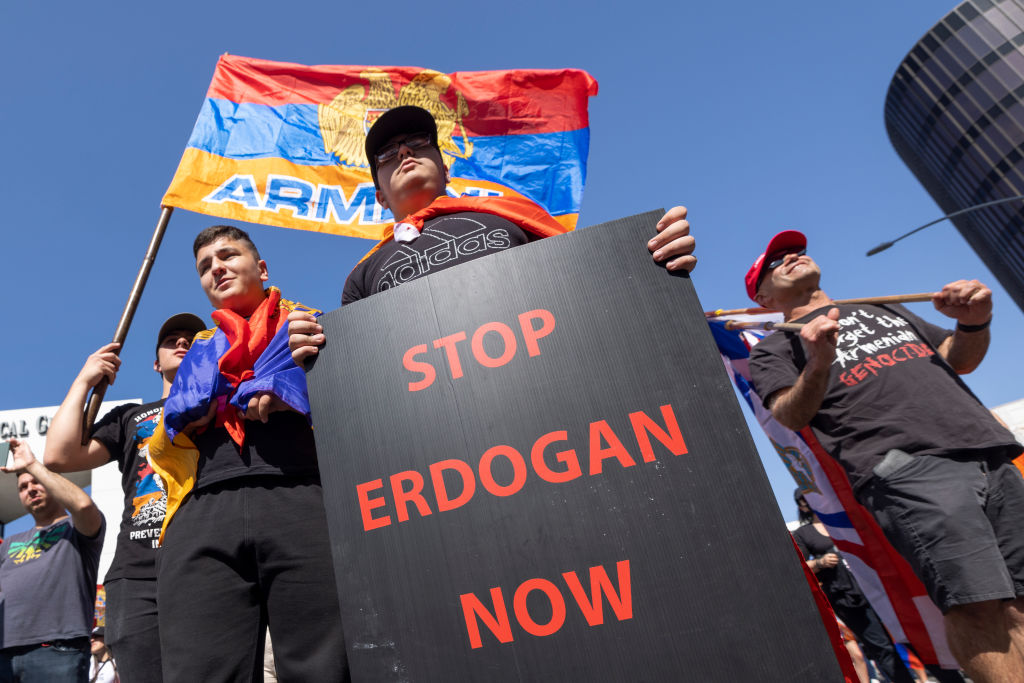Every year on April 24 we mark the 1915 Armenian genocide, in which up to 1.5 million Armenians perished at the hands of the Ottomans. But this year, we should also reflect on the present day, for Armenians are again facing a new set of atrocities as the world watches on with indifference.
Over the past year, ethnic Armenians have endured decapitations, sexual mutilation, cultural destruction, dehumanizing statements by authorities, and a constant threat of attacks—all coming from Azerbaijan, with direct military and economic support from Turkey, the successor nation of the Ottoman Empire.
The situation has descended into a humanitarian crisis as Azerbaijan has thwarted the movement of families, food, and medical supplies along Armenia’s border, a move condemned by the International Court of Justice and, just yesterday, the U.S. State Department.
This threat to today’s Armenians resurfaced in September 2020, when Azerbaijan launched an attack on Nagorno-Karabakh—a disputed territory inhabited principally by ethnic Armenians but internationally recognized as part of Azerbaijan, based on territorial lines drawn by the Soviet Union, which once controlled the area. The attack marked the beginning of the 44-day war, which saw over 6,500 killed and tens of thousands displaced. When a ceasefire was signed in December of that year, Azerbaijan ended up taking over most of Nagorno-Karabakh.
To the world, the war ended, but on the ground, the brutality against Armenians has continued.
But what concerned me most on my recent fact-finding trip to Armenia, my third in the last year, is that the rights abuses I had previously witnessed in Nagorno-Karabakh—including indiscriminate killings, torture, and arbitrary detention—are now being carried out by Azerbaijan in sovereign Armenian territory with impunity.
In March, my team and I documented the recent bombing of buildings, homes, a cemetery, and tourist sights in Armenia. We walked through school hallways adorned with children’s drawings of their burning homes and posters teaching kids to identify cluster bombs and other unexploded ordnances. Perhaps most unsettling were the videos we were shown by a woman who fled her village of Azerbaijani soldiers beheading and mutilating the bodies of her neighbors.
And as we met with torture victims and displaced families, we remained vigilant—since Azerbaijani soldiers, who had set up posts in Armenian territory nearby, had been shooting at people in their range of vision.
Azerbaijan’s preparation, persecution, dehumanization, and denial—each considered a “stage” of genocide—has prompted Genocide Watch to issue a genocide warning about Armenians under attack by Azerbaijan. Others in the global community, including the United States, have also expressed alarm. Following the shelling of Armenian villages in September last year, then-Speaker Nancy Pelosi and Congressman Adam Schiff condemned Azerbaijan’s attacks, and Senate Foreign Relations Committee Chairman Bob Menendez called for immediate cessation of economic assistance to Azerbaijan.
The outrage was fleeting, however, and Azerbaijan has yet to have been held to account.

Two years ago today, U.S. President Joe Biden made history when he formally recognized the Armenian genocide, promising to “remain vigilant against the corrosive influence of hate in all its forms” and to “recommit ourselves to speaking out and stopping atrocities that leave lasting scars on the world.”
For his statements to be more than mere words, the U.S. government must take action to discourage and deter Azerbaijan’s attacks against ethnic Armenians and any further incursion into sovereign Armenian territory. Those who have carried out egregious abuses against Armenians must be held to account.
One theme was pervasive in nearly every interview we conducted during our fact-finding trip: Armenians and residents of Nagorno-Karabakh insisted that the abuses we witnessed were part of a larger campaign to eradicate Armenians in the region. While some may dismiss these claims as alarmist, statements by leading Azerbaijani officials suggest otherwise.
Over the past decade, Azerbaijani officials have invoked language used in the Rwandan genocide and the Holocaust, referring to Armenians as a “cancer tumor” and a “disease” to be “treated.” More recently, the country’s authoritarian leader Ilham Aliyev has threatened to “drive [Armenians] away like dogs” and “treat” Armenians because they are “sick” with “a virus [that] has permeated them.” The Baku government even issued a 2020 commemorative stamp depicting a person in a hazmat suit “cleansing” Nagorno-Karabakh.
Equally concerning are Azerbaijan’s statements on conquering Armenia: Since Aliyev took power, officials have declared, “Our goal is the complete elimination of Armenians,” and claimed Armenians “have no right to live in this region.” Aliyev has asserted that “Yerevan is our historic land and we, Azerbaijanis, must return to these Azerbaijani lands…This is our political and strategic goal.” Last week he stated: “One day [Armenians] may wake up to see the Azerbaijan Flag above their heads.”
When tyrants and bullies speak, it is wise to heed what they say. Words may not kill—but they often lead directly to actions that do.
More Must-Reads from TIME
- Donald Trump Is TIME's 2024 Person of the Year
- Why We Chose Trump as Person of the Year
- Is Intermittent Fasting Good or Bad for You?
- The 100 Must-Read Books of 2024
- The 20 Best Christmas TV Episodes
- Column: If Optimism Feels Ridiculous Now, Try Hope
- The Future of Climate Action Is Trade Policy
- Merle Bombardieri Is Helping People Make the Baby Decision
Contact us at letters@time.com